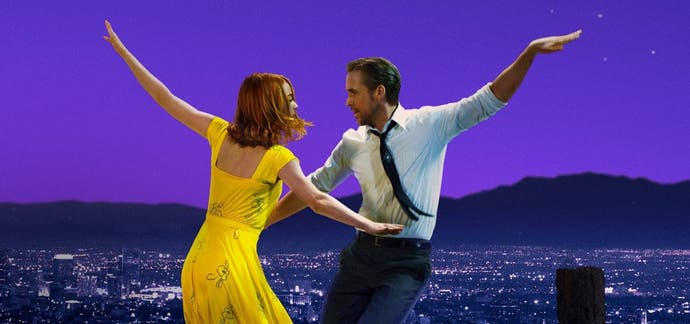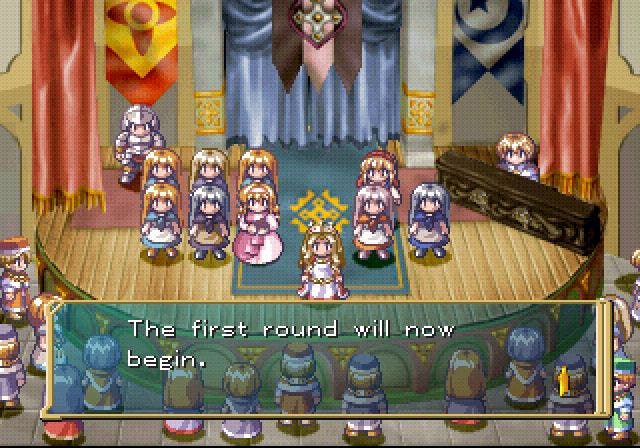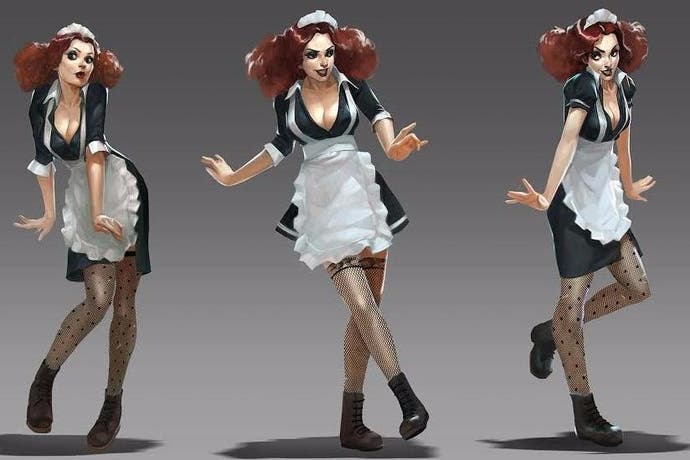The case for a video game musical
Here's to the fools who dream.
After years and years of protestation, I have something to admit: I bloody love musicals. I'm not sure why I've felt it hard to tell people about my love of a good old-fashioned story-driven sing-song - it's probably a combination of schoolyard intimidation and terrible memories of one production of Yeoman Of The Guard.
Still, the recent, splendiferous successes of Hamilton and La La Land have finally coaxed me into saying that I think musicals are downright amazing. But there's a problem. While I've been able to enjoy seeing a musical on stage, on the cinema screen, on the TV or listening to the score at home, I've never played one. The video game musical, or the video game based on the musical, is a thing that - for the most part - doesn't seem to exist.
Why is that the case? What is it that seemingly makes the video game and the musical incompatible? And is there a meaningful way for game developers to overcome it, so we can all live out our dreams and "press A to jazz snob" as Ryan Gosling's character in La La Land? To find the answer, I spoke to a couple of developers who also enjoy the toe-tapping delights of musicals and musical theatre.

"It's fair to say that I'm a fan of musicals." Mike Bithell, founder of Bithell Games and the creator of indie hits Volume and Thomas Was Alone, is probably the most unashamed fan of musicals that I've encountered across the industry. Where I am a Johnny Come Lately clambering onto the bandwagon ahead of Oscar season, Bithell is a full-blown musical aficionado. He fell in love with the form when his mother played Andrew Lloyd Webber musicals to him as a child. He attended drama school and took on the mantle of a character actor so he could appear in amateur dramatic musicals in his youth. Today, he has a model of the Hamilton stage on his desk after spending an inordinate amount of money seeing the show on Broadway last year.
Yet for all his passion, Bithell has found little support within the industry to help him achieve his dream of making a videogame musical. "I've literally had the conversation with high-ups where I've been pitching something else and I've said 'oh and by the way, once this thing does well, and you'll let me do anything I want, I want to make a musical theatre game,' and I've been laughed at because it is such a ridiculously lavish thing to do."
Though that might seem a bit mean, there's a simple reason for the scepticism: there really aren't many video game musicals out there - let alone successful ones. Rhapsody: A Musical Adventure for PS One and Nintendo DS, is one of the few that tries, but its desperately twee trappings, mediocre RPG mechanics and painful tunes makes it a fairly naff take on musical theatre.
And while there have been games that have folded musical elements into their stories successfully, such as Conker's Bad Fur Day's defining set piece against an operatic turd, or used music-inspired mechanics like the stunning Elite Beat Agents, each of these titles lack the overarching narrative structure to come close to being called a musical.
To understand why there are so few games that can be described as musicals, there are a few things we need to consider. Easily the most boring has to be the potential cost. "In terms of the cost of staging a West End or Broadway show, it's ridiculous because you're recording a studio level album, you're putting together a cast and having them perform and rehearse and all that stuff," Bithell explains. While a video game musical developer could bypass some of the expense, such as the cost of staging or hiring a cast for a set period of time, they'd still have to hire musicians and singers to perform their scores.
Beyond financing video games musicals, there's the problem of having the right vision. Anyone wanting to put on a brand new musical has to have the skill to tell a compelling story through song and dance, as well as considering day-to-day concerns like staging and infrastructure. This is challenging enough in itself, but it gets even trickier when you have to work out how to abstract this into a game world. Ideally, creators of videogame musicals would need either a writer on their team who understands games or a developer who can write music.
And this leads us to the final reason why videogame musicals remain rare, which is that few game developers actually know how to use mechanics to create an experience worthy of musical theatre. So much of what makes a great musical captivating comes down to the cast themselves. Skillful performers who are well-directed produce the magical Rodgers and Astaire moments that help carry the audience past the initial barrier of disbelief - "why are they suddenly breaking into song and dance?" - allowing them to really engage with the story.
This means there are two big mechanical challenges for developers. The first is finding a way for players - who are, by and large, not going to be skilled West End performers - to feel at home in the musical world. As Bithell explained to me, the challenge is to make players feel like they're part of the story and not that they're struggling on the stage. "I don't think the way to do a Hamilton video game is to make me hit a beat with the rhythm of the rap. I want to play as Hamilton. I don't want to play as Lin Manuel-Miranda."
Second, developers need to find a way to produce that experience without existing examples of video game musical to build on. Whereas an FPS developer will know that players have the basic controls nailed down, creators of musical video games would have to start from scratch and think closely about how their story changes the way it's controlled. After all, Dorothy skipping down the yellow brick road will offer a different challenge to recreating Simba's rise in The Lion King.
The good news is that some developers are already puzzling out solutions to all this. Ella Romanos is one of the co-founders of Rocket Lolly Games. The company is working on a mobile game based on the Rocky Horror Show called The Rocky Horror Show: Touch Me. But rather than a straight adaptation, it's a game that is inspired by and draws upon the source material to create a social music game.
Sure, you lead characters from the show through classic Rocky Horror song and dance numbers by swiping in time with the music. But you can also create your own dances and share them with you friends, coming up with your own takes rather than simply nodding along to the developer's work.
The driving force behind this approach is Romanos's belief that, realistically, you can't turn a musical into a video game. "It is really hard [to make a video game based on a musical] because what people love about it is not necessarily what makes a good game. We could never replace and we would never want to replace, or compete, with going to the theatre."
But that needn't be seen as a defeatist statement - in fact, it's quite the opposite. In Romanos's eyes, this has allowed the team to focus on creating an experience that serves the Rocky Horror cult. Everything from funny animations when a character falls over to that emphasis on user-created content ties into the social side of the show, allowing the team to channel the spirit of Rocky Horror without recreating it step for step.
In the same way that the best film-to-game adaptations nab the spirit of the film but do their own thing with it, developers of video game musicals need to be similarly assertive.
In particular, this means finding a way to make a player of such a game feel great when they're not that good at it. As Bithell pointed out to me, game developers are masters at using "smoke and mirrors" across genres to make players feel like experts. Whether it's FIFA players unaware that their passes are lightly guided or Resident Evil players unaware that the difficulty shifts if you're rubbish, developers have found ways to keep less talented players immersed.

In short, the real issue isn't whether a video game musical is possible - it's about whether it is possible to use mechanics to capture the euphoria and the practicalities without players feeling incompetent or patronised. And while it isn't clear how exactly it will be done, there are mechanics in games today that could be the foundations of such a game.
Adaptive soundtracks are becoming more sophisticated, giving games a greater sense of musicality, while established composers like Hans Zimmer and Clint Mansell are bringing their skills to the medium. There are also many games that encourage a natural sense of flow and rhythm, from flowing combat in Bayonetta to flying cars in Rocket League, which celebrate skill without punishing those who lack it. You could even look to narrative experiences like Dear Esther, which has been played live with an orchestral accompaniment.
Assuming developers can crack what makes a musical work, the question is how to sell it - Rocky Touch Me will be free to play on mobile with in-app purchases, which perhaps suits its target demographic, but again, there aren't many precedents to work with.
So do I think a video game can capture the spirit of musicals? Well, let me return to La La Land for a second. When I left the film, I remember feeling mesmerised by the gorgeous song and dance number on the Los Angeles hillside. I didn't care at that time about how it was done - I just let myself float away in the moment. If a game developer can bring music, lyrics and interactivity together in a way that lets us suspend all thought of the practicalities, that game will surely be worthy of consideration alongside the very best musicals.




